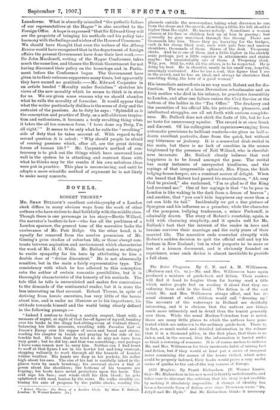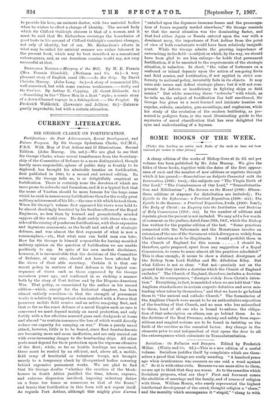The Botor Chaperon. By C. N. and A. M. Williamson:
(Methuen and Co. 6s.)—Mr. and Mrs. Williamson have again produced a mixture of guide-book and fiction. Their readers will find it hard to forgive them for having used a title which snakes people feel on reading it aloud that they are suffering from cold in the head. Tho fiction is of the sort which Mr. and Mrs. Williamson always affect, and has its usual element of what children would call "dressing up.", The accounts of the waterways in Holland are decidedly interesting, and it is obvious that the authors saw things much snore intimately and in detail than the tourist generally sees them. While the usual Marken-Volendam tour is noted, there are many little places to which the authors have pene- trated which are unknown to the ordinary guide-book. There is, in fact, so much useful and detailed information in the volume that it is a thousand pities, in the first place, that there is no index, and, in the second, that the information is buried under
so thick a covering of romance. It is of course useless to criticise Mr. aud Mrs. Williamson for their inveterate habit of mixing fact
and fiction, but if they would at least put a series of marginal notes containing the names of the towns visited, which notes could he properly indexed, their books would prove a very useful series of guides to the out-of-the way corners of Europe.
2335 Mayfair. By Frank Richardson. (T. Werner Laurie. 6s.)—Mr. Richardson in his new novel is frankly melodramatic, and takes care to discount the criticism that his story is not credible by making it absolutely impossible. A change of identity has been a favourite form of fiction ever since Stevenson wrote "Dr. Jekyll and Mr. Hyde." But Mr. Richardson thinks it necessary
to provide his hero, an eminent doctor, with two material bodies when he wishes to effect a change of identity. The second body which Sir Clifford Oakleigh chooses is that of a woman, and it must be said that Mr. Richardson oversteps the boundaries of good taste in his account of Clifford Oakleigh's constant changes, not only of identity, but of sex. Mr. Richardson's efforts in what may ho called his satirical manner are rather laboured in the present book, which may be best described as a sensational extravaganza, and, as our American cousins would say, not very successful at that.







































 Previous page
Previous page